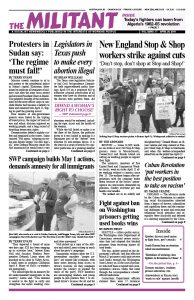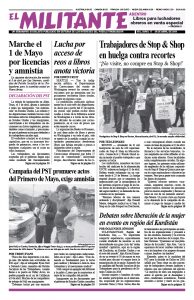SEATTLE — After a public outcry, the Washington state Department of Corrections reversed severe restrictions they had adopted that blocked prisoners from receiving almost all used books.
The ban, quietly posted on the department’s website, said that effective March 25 prisoners could only receive used books through the Washington State Library or, in the case of prisoners who had been accepted into correspondence courses, books that came through the correspondence schools’ official bookstores.
Corrections Department officials claimed there were 17 instances where “contraband,” including drugs, was found hidden inside books. But after the Seattle Times investigated, the department had to admit that the allegations weren’t true.
The imposition of Washington state’s restrictions are part of a national push by state prison officials taking steps to curtail the right of workers behind bars to read books, magazines and newspapers. Many have been beaten back when they became public.
Books to Prisoners, which donates thousands of books to prisoners in Washington and across the country, only found out about the policy there after books it had sent were suddenly being rejected by prison officials. They began checking to find out why.
In his memo overturning the ban, Rob Herzog, Washington assistant secretary of prisons, had to say, “The data does not support continuing restriction on donated used books.” In other words, the charge that drugs and other items were being smuggled into the prisons through used books is not true.
“Effective immediately all prisons will allow books to be donated to the facility” if they come from one of the four organizations on the Corrections Department’s approved list, which includes both Books to Prisoners and Books Through Bars.
“The fight against book bans in prisons and jails across the country is a frustratingly chronic issue,” Michelle Dillon, a board member for Books to Prisoners, told the Militant April 14.
In Pennsylvania, prison officials, like Washington state officials, used the pretext of drug smuggling attempts to require prisoners to get approval for every book and periodical they wanted to order — new or used. Officials were forced to relent, but books and magazines still have to be sent to be “processed” at a special facility before being sent on to prisoners, meaning delays.
Similar bans on books have been beaten back in New York, Maryland, New Jersey and in federal prisons. The Militant has successfully challenged attempts to ban the paper at prisons in Florida, Washington state, New York and other places.
PEN America and the National Coalition Against Censorship joined Books for Prisoners and other groups in calling for the Washington ban to be overturned.
“Even before this issue with the Washington Department of Corrections was resolved, we became aware of a new ban at the jail in Chatham County, Georgia,” Dillon told the Militant.
Sheriff John Wilcher instituted a new policy there that says inmates at the county jail in Savannah can no longer receive books or magazines from outside the prison. They are only allowed to select reading materials from book carts managed by jail staff.
“We have never before encountered a policy that so completely restricts detained persons’ access to books and publications,” said a letter urging the sheriff to rescind the ban, signed by David Fathi, director of the American Civil Liberties Union National Prison Project, and attorneys from the ACLU of Georgia.
“Prisoners need to have the right to read books, newspapers and other material of their own choosing, to think for themselves, to be part of the world,” John Studer, editor of the Militant, said April 15. “They are part of the working class and its efforts to transform ourselves and fight against attacks from the bosses and their government.
“We know that the attempts by government officials to censor what prisoners read will continue,” Studer said. “But the key thing the victory in Washington state shows, is that when those who defend the rights of prisoners speak out, we can push back those attempts. Let’s use that victory to join together to push back the censors in Chatham County.”

